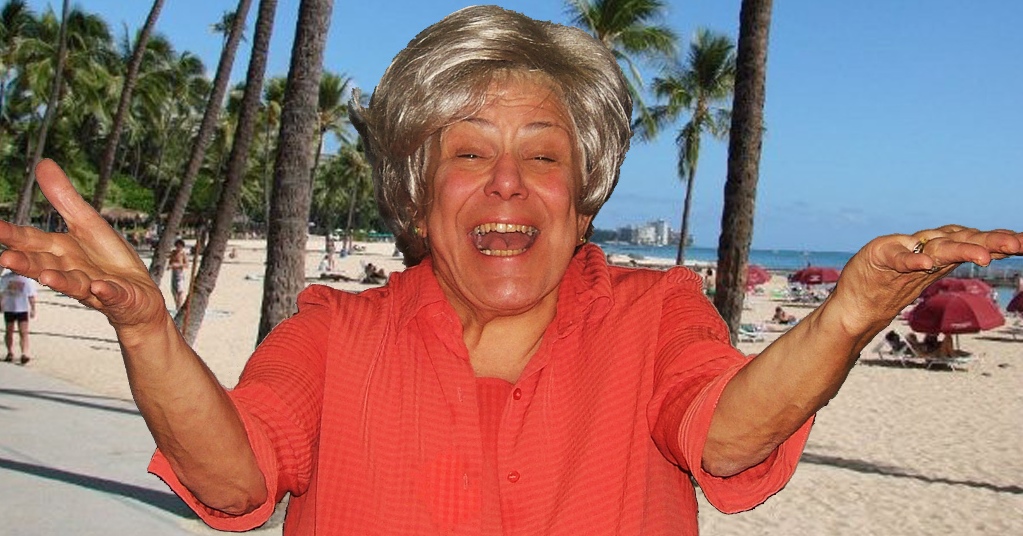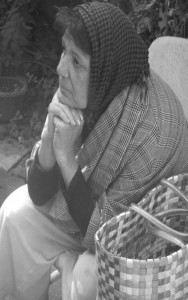
Blink, and it’s 1984 all over again.
Over here: Waggie and Friends, skipping sweetly through the landmines of improv comedy, quick wits and crack timing in tow.
Over there: Brassy Wendy Westerwelle, going for the gold in a one-woman show.
Turn off the radio, will you, please? Sounds like they’re playing Karma Chameleon again.
No, this is not an April Fools joke. Through some sort of cosmic coincidence, the ghosts of Portland past are flitting across the city’s stages starting tonight. The sweetly funny Waggie, pioneers of comedy improv in Stumptown (they were the first group to bring TheatreSports to town) are taking over the Brody Theater stage for a two-nights-only reunion Thursday and Friday.
 And Westerwelle, the irrepressible onetime Storefront stalwart who scored a big hit with her Sophie Tucker show Soph: A Visit With the Last of the Red Hot Mamas, takes on a very different personality in the Northwest premiere of Martin Sherman‘s play Rose, opening Friday at CoHo Theater.
And Westerwelle, the irrepressible onetime Storefront stalwart who scored a big hit with her Sophie Tucker show Soph: A Visit With the Last of the Red Hot Mamas, takes on a very different personality in the Northwest premiere of Martin Sherman‘s play Rose, opening Friday at CoHo Theater.
*
Waggie’s reunion gig at the Brody is a smash before it opens: both nights are sold out, and, as producer Domeka Parker says, she has “a waiting list for the waiting list.” The good news: there’s already talk about scheduling more dates, although nothing’s settled yet.
Waggie was so good and so influential in Portland not just because it was early to the improv game but also because its performers were seasoned veterans of the legit stage; actors who had both dramatic and comic chops. Domeka Parker’s parents, Scott Parker and Victoria Parker-Pohl, were core members, and they’ll be joined onstage by fellow alums David Fuks, Eric Hull, Cindy Tennant and Bob Zavada. Original funnyman Gary Basey couldn’t make the trip from his California home. His spot is being taken for these shows by a shirttail Wagger, Domeka Parker’s cousin Ian Karmel, who is a Groundlings alumnus and a member of her improv group, the Gallimaufry. (The younger Parker may not have been born in a suitcase, but she was “raised in the throes of improv,” and she’s become an improv performer and teacher herself: “I cannot escape it, and I promise you … I have tried.”)
Waggie, which stayed together until the mid-1990s, worked up a fine sweat on the TheatreSports circuit, playing tournaments in San Francisco, Los Angeles, Seattle, Edmonton and Calgary. It opened shows for the likes of gonzo journalist Hunter S. Thompson, Monty Python’s Graham Chapman, and cartoonist Lynda Barry. And it performed plenty of shows for the home crowd, including some memorable New Year’s Eve gigs.
Obviously people remember, and they’re eager to turn back the clock. Let’s just leave Kenny Loggins and Duran Duran out of it, though, shall we?
*
In England, Martin Sherman’s Rose was nominated for the Laurence Olivier Award as best new play in 2000. It hasn’t enjoyed such a welcoming reception in the United States.
“No one in this country has done it, except Olympia Dukakis,” Westerwelle said a couple of weeks ago over coffee and tea at Costello’s Travel Caffe. “And I talked with her on the phone yesterday, for 20 minutes. I don’t know how I got hold of her. I just called everyone I know across the country, I said, ‘How do I get hold of Olympia Dukakis?’ And I did.”
Sherman’s play was also revived last fall in the Upstate New York town of Croton Falls, with Annie McGreevey in the role.
Some of Westerwelle’s questions to Dukakis surely were technical. It’s a solo play, and its demands can be daunting — as Westerwelle says, “forty-seven pages of just you.”
Westerwelle is used to the peculiarities of the one-person show from her success with Soph, which opened on Thanksgiving Day 1984 at Storefront, played for six months, and took her around the country, including a hit run in Los Angeles, where she ended up living from 1985 to 1992, when she moved back to Portland. But Sophie and Rose are fundamentally different characters. For one thing, no song and dance this time around.
“Soph was an entertainer, a performer,” Westerwelle says. “Rose is not an entertainer. She’s older, she’s close to 80, she has a Yiddish accent. And she’s real. She’s just a woman with this incredible story.”
 Sherman is best-known for his 1980 Tony-nominated play Bent, about gay prisoners in a Nazi concentration camp. He wrote Rose for his maternal grandmother, and the story, Westerwelle says, is not only about her but also about the extraordinary 20th century journey of the Jewish people.
Sherman is best-known for his 1980 Tony-nominated play Bent, about gay prisoners in a Nazi concentration camp. He wrote Rose for his maternal grandmother, and the story, Westerwelle says, is not only about her but also about the extraordinary 20th century journey of the Jewish people.
As the play begins, Rose is sitting shiva in southern Florida, far from the Russian shtetl where she was born in 1920. “It’s just me, sitting on a bench in a park across from the ocean,” says Westerwelle.
Just who Rose is sitting shiva for isn’t revealed for a long time as she recalls the highlights of a remarkable life. Moving to Warsaw at 16, the arrival of the Nazis, the fires, escape. “Rose wound up in the sewer beneath Warsaw, and she stayed there two years,” Westerwelle says.
She became part of the exodus to Palestine but was refused entry. Put on a train back to Europe, she jumped off “and she was literally caught by an American sailor” — whom she married, and with whom she moved to Atlantic City.
Marriages, deaths, children, work, some dabbling in communes and drugs, a new American life that eventually has her running a hotel in Miami Beach. There’s a lot to remember — for actor and character alike — and that is the core of the play. Westerwelle praises director Don Horn, whose Triangle Productions! is producing in conjunction with Roscoe Nelson, for his sensitive approach to the story.
If Westerwelle feels a special connection to this material, it may be because she sees parallels in her own life. A Jewish girl from Chicago, she spent her years between 12 and 20 caring for her mother, who had multiple sclerosis, until her mother died. She got married, and her husband came down with leukemia. She was 26 when he died. Eventually she picked up and moved to Oregon. That was 1978.
“I was here for six months,” she says, “and I went to the Veritable Quandary, before it was hip. And I met Ross Kerr. And I guess I was being all dramatic like I do, and he said, ‘Who are you?'”
Kerr, a prominent actor at the old Storefront and elsewhere, hooked her up with Storefront and director/impresario Ric Young. Her career bloomed, from comic turns in the old Storefront burlesques to kids’ shows to a knockout production of Dario Fo‘s We Won’t Pay! We Won’t Pay! and to Soph, the show people still talk about after all these years, which she wrote with Vana O’Brien.
For Westerwelle, Ric Young was something of a godsend.
“You know, what you really need in this world is someone to believe in you,” she says. “And he did. He believed in a lot of people. He’d say, ‘You’re a genius. Now go do what you do.'”
She pauses and reflects, like Rose sitting on her bench. Right now, in this coffee shop, at this moment, the past is very much with her.
“He created miracles all the time,” she says.
*
Illustrations, from top:
— Wendy Westerwelle stars in Martin Sherman’s “Rose.” Photo: Don Horn/Triangle Productions!
— The “Waggie and Friends” logo.
— Westerwelle as Rose, sitting with her memories on a bench. Photo: Mark Larsen.